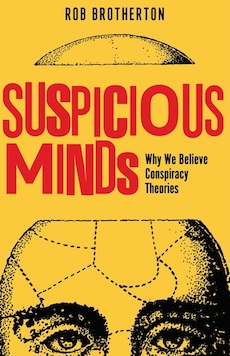Shortlisted for the 2016 ΦBK Award in Science
By Louis J. Kern
Rob Brotherton, Visiting Research Fellow at the Anomalistic Psychology Research Unit at Goldsmiths, University of London and assistant editor of The Skeptic, provides an interesting, accessible consideration of the psychic origins of conspiratorial beliefs. Contrary to popular understanding, he argues that conspiracy theories are not exclusively fringe phenomena but are the natural product of the brain’s function of providing an ordered, unambiguous vision of empirical reality. Ironically, then, the very rationality that underscores social organization and scientific discovery provides the basis for superstition and irrationality.
Causation, the foundation of ratiocinative thinking, also figures prominently in generating conspiracy credibility. Every event has a cause and conspiratorial acts are seen as the intended consequences of human action. Brotherton argues that our cognitive tendency to read facial expressions and actions as evidence of intent (theory of mind) acts as an “intention detector” that underlies our tendency to interpret coincidental or adventitious events as consciously planned. The psychological mechanism of projection reinforces this tendency. At once the basis for empathy, it provides a means for interpreting others’ enigmatic actions by imagining what we might do in their place in the same circumstances.
But the problem with conspiracy theories lies not so much with their etiology but rather with their irrefragable persistence. Again, basic mental functions are at work. Proportionality—the belief that the more momentous the event, the larger, more extensive its cause, the more complicated and metahistorical its explication—prevails. Straightforward explanations will not do. Then there’s “confirmation bias”; paranoia dictates that no one can be trusted; incontrovertible facts become further evidence of the conspiracy.
Brotherton essays a neutral stance on conspiratorial thought, though he does acknowledge that it is grounded in a “psychological disposition” that assumes an ideological interpretation of “facts” that often obscures reality. But he offers a reductionist reading of Richard Hofstadter’s seminal essay “The Paranoid Style in American Politics” (1964) that emphasizes its concern for the political fringe. Yet, Hofstadter’s book The Age of Reform (1965) expanded his discussion of conspiracy to embrace the concept of “status politics,” an irrational mindset driven by anxiety over declining status and declension of traditional values. Hofstadter found ethnic, religious, and class conflict to be central to suspicion and distrust and unresponsive to normal political and social processes. The sense that the conspiratorial mind feels profoundly dispossessed is a central insight into contemporary conspiratorial thinking that has fueled the Donald Trump phenomenon. As Hofstadter put it, the modern conspiracy adherents believe that “America has been largely taken away from them and their kind though they are determined to try to repossess it and to prevent the final destructive act of subversion” (“Paranoid Style”).
Brotherton’s work fails to get at this level of conspiratorial thought and obscures the racial tone that informs much of it. Indeed, he maintains, with insufficient evidence, that Hispanics and African-Americans are more prone than Caucasians to entertain conspiracy theories. More problematical is his scrupulous neutrality. Conspiratorial thinking not only obscures real problems and prevents their solution, but reinforces and sustains noxious prejudice, often with catastrophic consequences. Though Brotherton cites the centrality of The Protocols of the Wise Men of Zion to the Holocaust, other examples of disastrous conspiracy fallout include: the massive European witchcraft hysteria (1450-1650) resulting in an estimated 35,000-40,000 executions, the delusional Ghost Dance apprehension resulting in the decimation of the native Plains peoples, and the “Birther” canard that disputed President Obama’s legitimacy and greatly intensified, energized, and legitimized latent racialist politics.
Though flawed by its too generous impartiality towards conspiracy thought, Brotherton’s work offers a thought-provoking and interesting exploration of the psychological dimensions of mistrustful minds.
Louis J. Kern (ΦBK, Clark University, 1965) is professor emeritus of history at Hofstra University. Hofstra University is home to the Omega of New York Chapter of Phi Beta Kappa.




